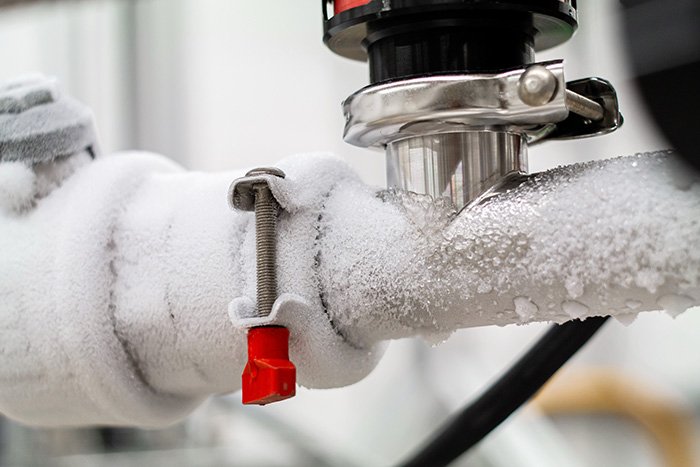
Can Water Heaters Freeze During Winter Months?
Water heaters are an indispensable component in most households. Resembling giant metal cylinders, they typically reside in either the utility room or the basement of your home.
But can these devices freeze during winter months? That depends on various factors; preventive measures, like insulating pipes to reduce risk, may help keep them from freezing over.
To ensure your water heater stays cozy during the winter, check out these handy water heater winterization tips.
1. Turn the heat up
Water freezes when temperatures fall, expanding under pressure and potentially bursting pipes or damaging the heater. If this happens to your water heater or its pipes supplying it, turn off all power and gas before disconnecting and moving to a warmer area like a garage or room with space heating – this should allow enough warmth into the unit to melt.
Insulating both your tank and tankless water heaters will help avoid freezing pipes. Foam insulation or electric pipe thawing machines, which transmit low voltage, high amp electricity through metal pipes to quickly thaw them, may also help.
If you own a gas-powered water heater, make sure it is connected to either a backup generator or has solenoid valves that will open in case power goes out. Also, consider installing a recirculation system to keep pipes warm continuously – these models often include features already integrated within them – for optimal operation in areas with frequent power outages.
2. Insulate your pipes
The water heater freeze protection system only offers limited protection to its connected pipes. When temperatures drop drastically, water in these lines may over-expand and burst, creating costly plumbing issues and costing thousands.
Insulating your pipes with polyethylene or neoprene foam sleeves from your local hardware store is one way to stop this problem from arising, as are sealant strips at air gap locations where pipes run through exterior walls and cabinetry – these allow cold air in from outside as well as heat out, leading to freezing of pipes.
If your pipes freeze, open and run the faucet until all the ice melts away. Apply heat directly to frozen sections of pipe using hairdryers, electric heating pads or space heaters or by wrapping in heated blankets; but make sure that once your pipe thaws, you find and locate its shutoff valve so your home won’t become vulnerable once the frozen pipe thaws.

3. Keep your water hot
Temperature drops can leave your water pipes vulnerable to freezing, with overexpansion threatening to burst or break them and present homeowners with an immense inconvenience in terms of time spent defrosting them.
You could also invest in electric pipe heating cables and wrap them around each pipe to keep them warm.
Installation of a recirculation system can also help keep your water warm, as these systems are built into many water heater models and supply hot water on demand to different fixtures throughout your home.
Ensure the power to your water heater is always turned on, ensuring the freeze protection solenoid valves continue working correctly. Additionally, if you live in an area prone to power outages, consider investing in a battery backup system for your heater.
4. Keep your water heater clean
Cold temperatures can give rise to your pipes freezing and over-expanding, potentially bursting them all together and leading to costly water heater damage. Not only is this an inconvenience but also detrimental to its performance.
Your water heater can be protected from freezing by insulating and adding pipe heating tape and installing a unique cover on tankless models to stop their water from freezing over.
Draining your water heater before leaving home for winter can also be helpful, particularly if you plan on being away for an extended period. For assistance in draining your heater safely, professional plumbers are readily available.
Modern water heaters feature built-in pressure relief valves that automatically open and release pressure if the unit freezes. However, older models may not. Be sure to cover both intake and exhaust vents to protect them from debris build-up and avoid airflow issues.
5. Don’t forget your thermostat
Avoid frequent adjustments of your thermostat during the winter months. Fluctuating temperatures can increase the risk of freezing by allowing the water heater to cool down and potentially reach freezing temperatures.
Recirculating systems should also be installed in your plumbing to prevent the freezing of your water heater and its pipes and help protect them from bursting or freezing over. Furthermore, plugging your heater into power during cold weather ensures its freeze protection system will function optimally.
At the end of every winter day, it is wise to have someone come by your house daily and check to ensure the heat stays on, particularly if you plan on being away for an extended time. This will help ensure hot water remains at an appropriate temperature and the furnace doesn’t need to work overtime.




